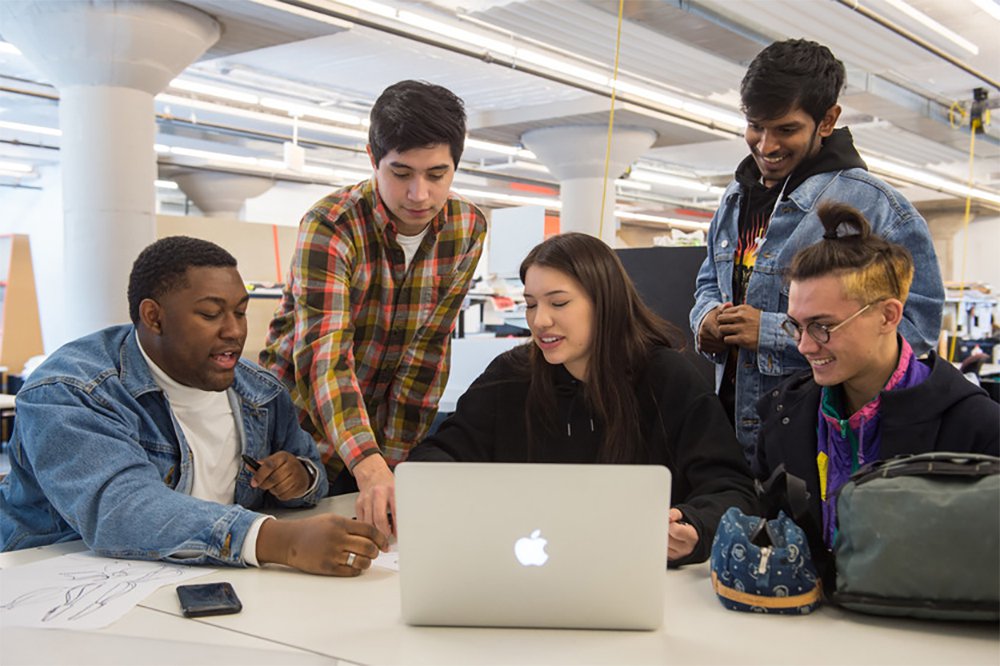Reimagining the Core
A&S faculty, students and alumni take a fresh look at key curricular requirements.

Think how much life has changed in the past few decades. Technology alone has evolved exponentially—flip phones and Myspace, anyone?
To ensure the A&S curriculum is reflecting and responding to this social and cultural transformation, Dean Karin Ruhlandt has charged a cross-disciplinary committee from the College of Arts and Sciences (A&S) | Maxwell School of Citizenship and Public Affairs with a major overhaul of the foundational liberal arts core (LAC), which last took place more than two decades ago.
“As we embark on the important work of reexamining and reimagining the LAC, we’ll be exploring innovative ways to enhance students’ learning, while preparing them to take on longstanding issues such as social justice, climate change and medicine, health, and well-being—some of A&S’ historic areas of academic strength,” Ruhlandt says.
Through the carefully crafted liberal arts core (LAC), students in A&S | Maxwell have a foundational, flexible roadmap of course requirements allowing them to customize their undergraduate studies. The LAC is also used by Syracuse University’s other schools and colleges as a resource in building their own curricular requirements.
The LAC guides students through a range of courses in the humanities, sciences, social sciences and mathematics, so they can develop the timeless—and priceless—tools of critical and creative inquiry, applicable throughout life and in every career. It is intended to assure a consistent academic experience from year to year, and so major revisions are infrequent.
“With the updated core, students will continue to be assured of a top-tier, contemporary liberal arts education—one that reflects our world today and fosters the academic inquiry and ethical compass that are hallmarks of the A&S experience,” says Lois Agnew, A&S associate dean of curriculum innovation and pedagogy. Agnew is also a professor of writing and rhetoric, as well as interim chair of the Department of African American Studies.
As part of their ongoing, broad evaluation of instruction and curricula, leaders in A&S determined in 2020 that an update to the LAC would be appropriate, considering new approaches and developments across academic disciplines and in the larger social, cultural and economic environments.
“Our aim with the new liberal arts core is to provide a comprehensive foundation for the education of ethical, global citizens confidently oriented to the world around them,” says Erin Mackie, LAC committee chair and professor in the Department of English.
Faculty Representatives
Since last summer, A&S has been working on multiple fronts to review and refresh the LAC requirements for a new generation of students.
A committee with representatives from the humanities, science/math, and social sciences, is evaluating the current liberal arts core and will be recommending changes, with a draft proposal anticipated later this semester. Students will have an opportunity to review and comment on the draft.
Members of the Committee
Humanities:
- Erin Mackie (ENG), Chair
- Luvell Anderson (PHI)
- Theo Cateforis (AMH)
- Jeanette Jouili (REL)
Sciences:
- Jay Hubisz (PHY)
- Robert Moucha (EES)
- Leonard Newman (PSY)
- Melissa Pepling/Scott Erdman (BIO)
Social Sciences:
- Alan Allport (HIS)
- Peter Castro (ANT)
- Margarita Estevez-Abe (Political Science)
- Azra Hromadzic (ANT)
Timeline of Work
- Spring 2022: Core curriculum proposal draft will be shared with faculty and students for feedback.
- Fall 2022: Core curriculum proposal will be submitted to the Curriculum Committee.
- Spring 2023: Core curriculum in place, if approved.
Alumni Sharing Their Experiences
In addition to input from faculty and students, alumni are also contributing to the reimagining of the liberal arts core. Over the past year, the College has hosted more than 25 virtual roundtables where alumni share their opinions on what liberal arts students need to succeed today.
“A&S alumni consistently acknowledge the importance of their liberal arts education in their careers and their lives,” notes John Quigley, A&S’ assistant dean for advancement. “They’re successful in a wide range of fields including health care, government, education, finance, communications and law,” he continues. “Their feedback is incredibly relevant and insightful.”
While feedback is still being collected, alumni comments centered around some recurrent themes, including:
- The liberal arts core needs to emphasize communication, analytical and problem-solving skills.
- It should promote experiential learning and entrepreneurial thinking.
- The liberal arts need to offer flexibility and breadth in academic programs.
- Diversity, equity, and inclusion—including cross-cultural competencies and social justice—should be a focus.
“Through the liberal arts—that powerful combination of humanities, sciences, math and social sciences—our students are equipped with the intellectual heft, ethical thinking and interpersonal skills to take on whatever the future holds,” says Karin Ruhlandt, dean of the College of Arts and Sciences. “I am grateful to the members of the committee for updating the Core while staying true to those values, and I look forward to seeing their recommendations.”
For more information about the LAC revision, contact Professor Mackie.
